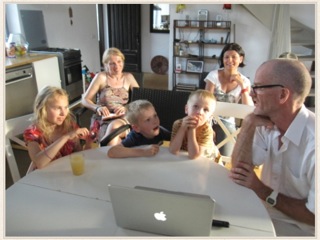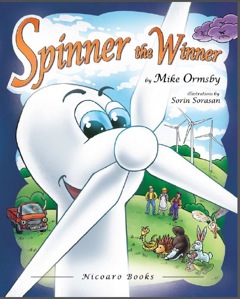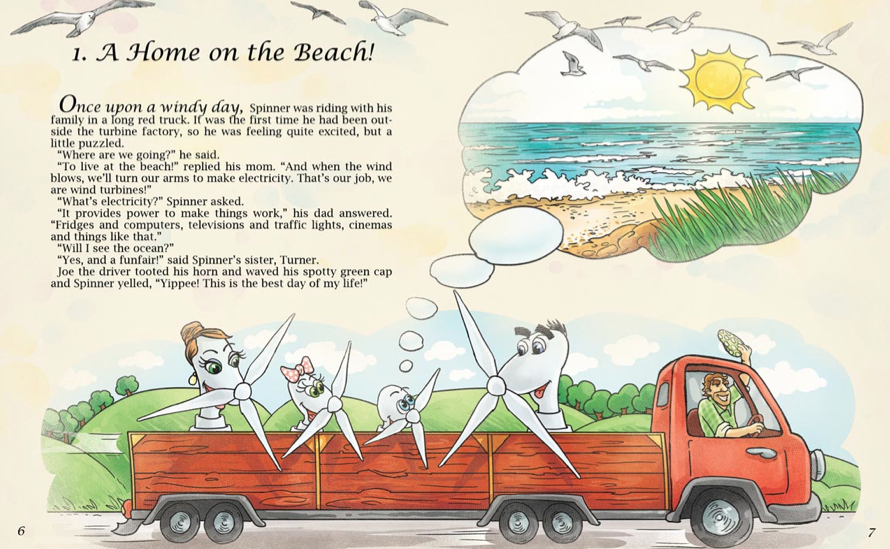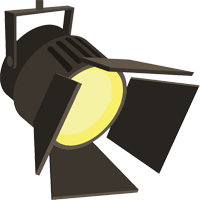
Six out of 10 Americans cannot name one source of renewable energy. A book about a talking wind turbine by Mike Ormsby aims to change that
Mike Ormsby is a British author and journalism trainer. Books written by Mike Ormsby include Never Mind the Balkans, Here’s Romania (2008), Child Witch Kinshasa (2013), Child Witch London (2014), Never Mind the Vampires, Here’s Transylvania (2017), and Palincashire: Tales of Transylvania (2017). Mike Ormsby and his wife Angela Nicoara have also written and published a children’s book together, “Spinner the Winner.” Mike Ormsby sent me a review copy and Mike Ormsby kindly agreed to write this guest post on how the book came to be.
Talking Turbines by Mike Ormsby
Journalists aren’t supposed to cross the line, never mind fall head over heels for the subject of their story. But I did, in 1994, and I don’t mind admitting it.
Love at first sight, actually.
I was smitten by the alabaster glow, slender shape, and serene presence.
I had never been so close to such awesome beauty and could only gawp.
All that latent energy!
It was like standing next to a bonsai except this baby was 30 meters tall and had three graceful arms.
A breeze whistled across the steep Welsh hill and I watched and waited, squinting in sunlight, hoping the arms would turn. No chance.
“So, what do you think?” asked the ruddy-faced farmer, standing nearby in a tweed cap.
“It would make a nice story for kids,” I said.
The farmer plucked a stalk of grass from the hedgerow, looking puzzled. “The wind turbine?”

Author Mike Ormsby speaking to a group of children about Spinner the Winner in Transylvania
I pointed up.
“Can’t you see a face, in the nacelle? It’s perfect. Just needs eyes. A name.”
The farmer did not look up.
He was looking at me, in stunned silence. You’re mad, lad.
I held out my microphone and interviewed him on tape.
He spoke for fifteen minutes, explaining why turbines were a pain in the redneck, then wandered off in his muddy boots.
I stood alone with my new love.
We didn’t say much.
Turbines don’t talk.
But what if they could?
Eventually, as promised, an official from the electricity company turned up. We peeped at the consoles inside the turbine.
“Star Trek or what?” he said, hands in the pockets of a long black coat.
I tried to stay calm, do my job, and play Devil’s Advocate. I told him certain locals were concerned about squeaks, noise pollution.
He told me certain farmers were entitled to their opinion and added with a knowing grin, “Coal is noisy, too. Spits and sparks in their hearth. Am I right?”
“Absolutely.”
Walking back to the car park at the foot of the hill he said, “You like our turbines.”
It wasn’t a question.
I drove away, stealing glances in my mirror.
I watched those long white arms turning on the hill. A family of turbines waving, urging me to tell their story.
What story? Something about a man in a black coat and maybe a belligerent local with malice in mind.
I wrote a draft over summer; read extracts to my mum on the phone.
Very nice, she said.
I put the manuscript in a drawer.
I would stick to journalism.
Who, why, what, where and when?
Years passed, dust gathered. I married, moved to Boston and got invited to a children’s literature festival at Harvard.
In the coffee break with some of the writers, I mentioned my turbine tale.
“You should get that published,” one suggested.
I promised I would try; after my book of short stories about Romania and my novel about Congo. She gave me the look. What are you, nuts?
Early in 2012, my wife Angela heard a podcast about kids’ books selling on Kindle.
The stats were stupendous: almost 300% increase in 12 months. Selling like hot coals. Absolutely.
“We should try your turbine story,” my wife said. ” I’ve always liked that. Topical, original, and funny.”
“Who’s going to publish it?” I asked.
“I am.”
Angela found a suitable illustrator—nice and retro at a fair price—and spent many hours after a hard day’s work learning about self-publishing.
I tweaked my text and held focus groups with children in Bucharest, London, and Transylvania.
We found there’s no such thing as what children like, because they’re so different.
Parents likewise: some want a long story for lazy afternoons, some want short ones for bedtime.
We pitched our turbine tale in the middle: decent length but big images—double spreads where possible—and coloring-in pages for younger kids.
We spotted one constant: all our test readers liked extra details in the visuals, so we added lots: a cheeky mouse here, a creepy black cat there.
We also tried to give every significant item in the story—even a can of oil—a face, a touch of personality.

Spinner the Winner by Mike Ormsby teaches children about wind turbines and renewable energy
Ten months later, Spinner the Winner was peeping at us from Amazon.
The story?
A little turbine is separated from his family, develops a squeak and is vandalized.
But when a nasty storm plunges the nearby town into darkness, he saves the day and wins lots of new friends.
It’s pretty much what I came up with, on my drive back to the BBC.
Spinner has had nice reviews (all 5-star, so far), the Facebook page got 350 hits in three weeks and young readers have sent photos to Spinner’s blog.
A volunteer teacher in Texas—concerned about local fracking—read the book to a primary class and told us the kids stood up at the end ‘to twirl their arms like Spinner.’
Some libraries and schools back home in Liverpool are interested in a launch/reading session and I’ve been invited to address the Children’s Literature Department at Cambridge University.
Our big little turbine is winning friends.
Of course, it’s not all good news—one blogger declined to review the book because two of his kids felt the book was too long, although his 3-year-old son stayed the course.
I find that interesting not so much because his older kids lost interest—that’s life—but because he’s the second parent to tell us a 3-year-old stayed glued.
We never expected that in our wildest dreams.
Likewise, a journalist in DC wrote to us, “Spinner is the first ‘chapter’ book my little Lucy has finished. She’s been hauling it around for a week. A major achievement, thanks to you guys.”
That felt pretty good.
Less heartwarming was the email I got recently from my aunt in Canada, who had nothing nice to say and took me to task on numerous points, including the technical minutiae:
The delivery of electricity and the production of electricity are two different things. The book suggests telegraph poles and wires are bad while underground cables coupled with a wind turbine are good. These supply systems are neither good nor bad, but simply reflect aesthetic and practical choices. How did Spinner manage to come to the rescue and send electricity into the town without underground cables?
I won’t bore you with my detailed response, except to say, had my clever aunt read more carefully, she would’ve heard Spinner explaining he is linked to underground cables.
I was quite relieved she had not asked how a turbine could chat with a badger, frog, mouse, snake and owl.
To be fair, she later apologized, told me her grandchildren loved it, and she had been having a bad day.
If and when the question arises, ‘Who is Spinner for?’ My answer is, ‘Kids who might like it and adults who might need it.’
If, as a writer, you try to second-guess ‘a target group,’ and strive to ‘hit’ everyone in it, you’ll fail.
Be true; write what you want, and let the chips fall. Art not artifice.
Sales wise, Spinner has shifted 1,100 copies in two and a half months.
The Romanian Wind Energy Association, CEZ, and GDF Suez have ordered branded translations for Christmas in Romania, where Spinner is ‘Morisca fara frica’ (The Fearless Whirligig’).
We’ve had inquiries about translations for Serbia, Finland, Wales, and South America. We’ll see.
French is next.
The Minnesota-based Kid Wind, a superb educational resource, recently approved Spinner for its recommended reading list.

A family of wind turbines sets off in the book, Spinner the Winner, by Mike Ormsby
So our plucky hero is on the renewable map, just about.
Did we publish Spinner to promote wind energy?
No and yes.
I wanted to write for kids about a wind turbine.
Of course, it can be seen as ‘pro-wind energy,’ and I’m happy with that, not just for environmental reasons, but because it’s nice to play a small part in the impressive educational work of groups like Kid Wind Project, Hi Tech Kids, and many more.
But it was really the debate I found interesting—the pros and cons, especially for a story: every tale needs drama.
I found some in a local row over a squeaky turbine.
I don’t agree that they are ugly or too noisy but then again, I don’t live near one.
What if I did?
I wanted to give the opposition their say, which brings me to a rather bizarre real-life twist that proves fact is often stranger than fiction.
My wife and I are based in Baku, Azerbaijan.
It’s a super-rich capital city, the ruling élite awash in oil and gas.
The principal of Baku-Oxford School told us, “You really have something here; Spinner could sell a million copies.”
We scheduled a session with 300 pupils in his school’s Reading Buddies program (older kids help younger ones), and imported a box of Spinner books for sale.
Then a well-connected local expert in renewables suggested we also translate and publish the story in Azerbaijani; he would help market it for a cut, loved the images.
His English was weak so we explained the story page by page.
He looked like he had seen a ghost and said, through a translator, “Too subversive. The march on the lazy Mayor will be seen as incitement to revolt.
“The political opposition in Azerbaijan will like it, but the Government will not. It’s too much for here. Unless…”
He suggested, only half-jokingly, we convert our ‘baddies’ (lazy mayor and black-suited bureaucrat) into Armenians, convert our heroic blue-collar driver to a white-collar Azeri official and change our illustrator’s name (“It sounds too Armenian”).
We declined, politely.
Tanks but no tanks, as it were.
We see Spinner as Eco-tainment for kids, not propaganda for grown-ups.
Sadly, I saw little choice but to cancel my reading session at Baku-Oxford School.
Too risky by far.
Talking of grown ups, I’ll end with a timely statistic.
Kid Wind Project claims six out of ten adults in the United States could not name a renewable energy source.
If education is the key to most doors in life, Angela and I hope our picture book about a brave little turbine might help kids answer that question, at least.
Thank you for reading, and thank you to Jennifer Margulis for inviting me to post.
Please visit Spinner’s blog for free chapters.
Your kids might like the book.
Have a breezy day!
Mike Ormsby 13.12.12
 This is a Spotlight Saturday post. Spotlight Saturdays showcase books and authors—both contemporary and classic. If you’re a published author with a new book coming out and you are interested in being showcased on JenniferMargulis.net, please ask your publicist to contact us.
This is a Spotlight Saturday post. Spotlight Saturdays showcase books and authors—both contemporary and classic. If you’re a published author with a new book coming out and you are interested in being showcased on JenniferMargulis.net, please ask your publicist to contact us.
Enjoy these other Spotlight Saturdays:
A plucky pig heads for Mars
A plucky LA writer explores sex via text message in her new novel, Everything is Just Fine
Tales of women in the gas and oil industry
Posted: December 23, 2012
Last updated: October 5, 2019
This is a wonderful success story, so congratulations! I especially liked the advice “Be true; write what you want and let the chips fall.” You should easily be able to sell Spinner in Germany, too. The wind turbines, off the German coast, are majestic. I am in favor of wind power and wind farms, but was against one very tall turbine close to civilization. (When our small town tried to install one, citizens managed to defeat the project for a variety of reasons but those I noted were noise, more than a squeak, and the flicker effect as the blades turn for anyone living nearby.) Spinner sounds like a great way to get children thinking about alternative energy.
Hi Alexandra, thank you for your comment. I have not heard about the ‘flicker’ effect but can imagine it could be a problem. Re-Germany, I’m glad to hear there could be interest there too. We’ll be following up. Happy Holidays! Mike
It’s so important that young children be educated about alternative energy sources. Looks like this would be a great resource to teachers.
Dear Irene, thank you for your comment. Fingers crossed, we do hope the book might prove useful to teachers. We were disappointed about what happened in Baku, but that’s life. The Kid Wind Project is a fantastic resource and I would urge any educators / parents reading this to visit that site. We’re honoured to have made their grade. Happy Holidays! Mike
Great article. Great book. My 10 year old doesn’t read but he was hooked to Spinner the Winner — more than he is to any kids book I can remember.
Hi Rupert, I’m glad to hear Spinner was well received! Happy Holidays! Mike
I have had mine for 2 years now. I have started my bauckp generator about 2 dozen times. I have 91 hours on my bauckp which was installed at the same time as my wind and solar. Solar PV cells are estimated to last 50 years unless they get to hot which is over 160F for long periods of time. Wind generators will last for 20 years unless they get destroyed for high winds (over 55mph) so it is recommended that their is a brake on it that automatically stops or slows down your wind generator at high speeds.
Great way to get kids thinking about renewable energy sources. I’m for the idea in theory, but wouldn’t want a huge turbine in the general vicinity of my house.
Hi Jane, thank you for your comment. I agree that having a turbine looming large in one’s backyard might not be a welcome development; it seems some ramblers (walkers) in Wales have voiced concerns on same in the past. Happy Holidays! Mike PS. Will peep at your blog.
PS. Talking of ‘general vicinity’, have a peep at this interesting report from Mid West Energy News. It makes sobering reading. http://www.midwestenergynews.com/2013/01/08/analysis-politics-drown-out-facts-following-wisconsin-wind-noise-study/comment-page-1/#comment-34988
It’s funny that I read this today. We were driving back home from the holidays, past this huge dump that we always pass–the kind that stinks of methane and has poor sea birds all over the place and is–scarily–right next to a large body of water. It got me thinking about the capture of methane and how–even though it’s not technically renewable, it should at the very least be standard or required at a dump. Might as well make the most of the stink, you know? That got me thinking about how there really isn’t a perfect energy source. The fossil fuels all pollute. Dams kill salmon. Wild turbines kill birds. Solar is good, I suppose. Maybe there’s something wrong with that, too. Maybe houses should come standard with solar and a windmill in the back yard? We need to find a way to use less energy in general, but it seems our society keeps marching in the supersize direction.
Alisa, you make a valid point. I would imagine (or hope) that one day, in 300 years time, folks will be trapping methane 24/7, reading of savages like us and scratching their eggheads.
This is such a wonderful story. I’m so glad you were able to successfully self-publish such a must-needed book. Congratulations. I’m a former biology teacher and, though I taught high school, I was always all about educating my students about being respectful of the environment. The illustration is very cute. It’s great you found an illustrator who could turn the little wind turbine into a cute character. I’ve just written my first children’s book – it’s a chapter book also – and am having a difficult time finding an illustrator who can create cute characters.
Jeanine, thank you for your kind words. If you wish, I can put you in touch with the illustrator. His English is not so hot but he’s reliable and versatile. Email mike.ormsby@gmail.com, for details?
Six out of ten Americans can’t name a renewable energy source? Wow. In my 4th graders class they had lengthy discussions on erosion, renewable energy, etc. Congratulations on your book
Dear MyKidsEatSquid, I know, it’s a staggering claim/study. First time, I had to go back a few days later to make sure I had not misread it. I suspect part of the reason for such a bizarre ‘result’ might be that ‘renewable’ is a bit of a weird word. I wonder if the results would have been different, had the question been, “Can you name an alternative energy source?” Just a thought. Thank you for your comment, have a breezy day. Mike